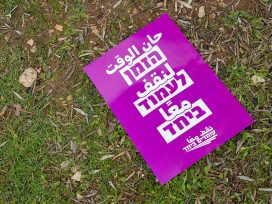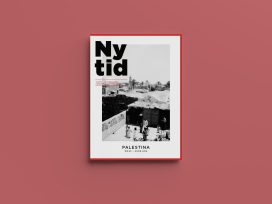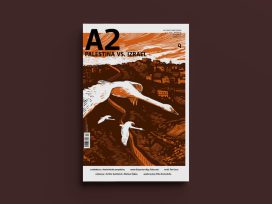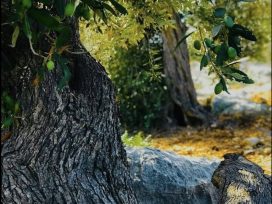Belgrade’s annual “October Salon” is without a doubt one of the most important events in a sparse exhibition season for contemporary art in the city and Serbia as a whole. The concept came about several years ago as an opportunity to present international artistic tendencies, with a guest curator delegated by the October Salon Council to select works thematically. The event marks a rare possibility for the Serbian public to become acquainted with the latest output in both the local and the global contemporary art scene. The organisers and the curators therefore have a major responsibility to carefully and professionally fulfil their obligations to the public and set up an exhibition that allows the audience to interact, explore and contemplate artistic interpretations of various aspects of contemporary life.
Under the slogan “Time we met each other”, the 2011 October Salon ran from 20 October to 4 December 2011 at the Museum of Yugoslavian History, Belgrade. The thematic framework was defined by the curators Galit Eilat from Israel and Alenka Gregoric from Slovenia, who chose to focus on the notion of individual responsibility and its organisation in the local socio-political context. The selection comprised of twenty-seven works whose approach was based on observing reality as a method of simulation, experiment and re-enactment; their goal was to confront the present through re-enacting the recent past. However the relatively small number of works selected to represent the curators’ concept did not allow for a thorough elaboration of their predefined theoretical notions and artistic strategies. There were only scattered visual references, while a full contextualisation of the entire exhibition was lacking. Given the limitations of this text, it is impossible to provide a more detailed analysis and question the problematic and complex theoretical postulates. Instead, I will focus on the relation with the viewer, the audience, and the extent to which it fulfils its primary intention to question the notion of responsibility.
Disrupting direct communication with the viewer who wants to understand the exhibits without interruptions was insufficient sound isolation around many of the video works. Sounds of different intensity were mixed together, creating initial confusion while watching the show. Similarly, the narrative concept offered by the curators created difficulties in understanding the topic and its aim. The selected works mostly related, either directly or indirectly, to the war in the former Yugoslavia and its consequences (works by Katarina Zdjelar, Mladen Miljanovic, Nemanja Cvijanovic, Ibro Hasanovic, Nebojsa Seric Soba, Vahida Ramujkic) and the Palestinian-Israeli conflict (Jael Bartana, Josi Atja and Itmar Roz, Amir Jaciv, Avi Mograbi, Haled Dzarar). This juxtaposition of two completely different conflicts from the recent past is unjustifiable from a political, ethnic and political perspective. The former wars were fought because of conflicting political, ethnic and nationalist interests between Serbs, Croats, Bosnians, and Albanians, within a single country, in order to establish new, smaller countries; the latter is a conflict between two opposing sides that has been raging for decades and is still ongoing, triggered by the foundation of Israel in Palestine, where the borders between the two countries have been successively redrawn. The viewer, catapulted into the midst of these conflicts, which were re-enacted before their eyes through artistic interventions, was left little room to discover things on their own or make up their own mind about the past as simulated by the exhibition’s selection.
This representation of “reality” was accompanied by works in which the role of the artist was so dominant as to be almost didactic. Works by Artur Zmijevski, Milica Tomic, Katerina Seda, Akram Zatari or the Etcetera Group subjectively interpreted political and everyday situations and as a result defined and controlled the narrative frameworks of the past and their consequences for the present. Selection of such artistic standpoints limited the visitors’ freedom to respond to the more or less known past and present-day events and phenomena without political or ideological preconceptions. On top of it all, unproductive criticism of the relevant institutions’ cultural policies was woven throughout the display and repeated in the curators’ statement published in the exhibition catalogue. Let it be recalled that the October Salon is organised and sponsored by the city and state, the very institutions that were criticized, using public funds, that is to say taxpayers’ money. So the responsibility for the exhibition is ultimately lies with them.
As a result, in contrast to the initial aims of this year’s October Salon, there was only a superficial interpretation of the past, one based on a paradigm of good vs. evil, as well as victim vs. criminal, told from a subjective and often manipulative artistic perspective. Constructed in such a way as to justify the curators’ and artists’ positions, this exhibition was self-serving and generally made no attempt to establish a mutual and productive relationship with the viewer. Several works did, however, did provide an exception, employing carefully planned visual ideas of the given topic. Art Klinika’s installation and Jan Fabre’s sculpture, as well as the ironic manipulation of reality in Mladen Miljanovic’s and Artur Zmijevski’s video art, opened a field of interest to the viewer, who was entertained and encouraged to think. Unfortunately, these works did not manage to improve the overall impression, one the visitor left the Museum of Yugoslavian History, of incompleteness and inaccessibility. “It’s time we met each other” seemed only to be following public trends and everyday politics, recycling old ideas and the atmosphere of the unruly Nineties, rather than offering a responsible relation to the present based on past experience, in order to face the inevitable challenges of the future.






